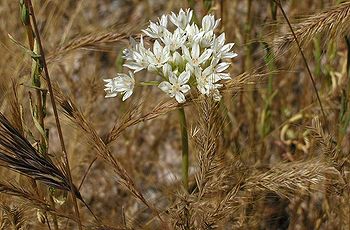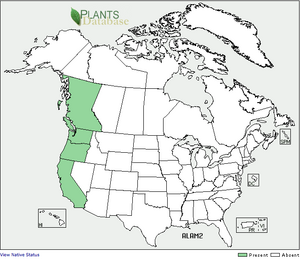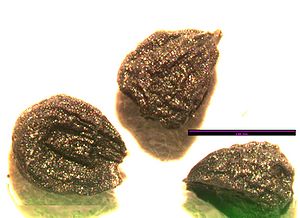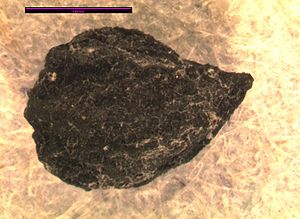Difference between revisions of "Allium amplectens"
(→Habitat) |
|||
| Line 34: | Line 34: | ||
California, Oregon, Washington, and British Columbia. | California, Oregon, Washington, and British Columbia. | ||
===Habitat=== | ===Habitat=== | ||
| − | Open or wooded with clay soils <ref name="Jepson"/> | + | Open or wooded areas with clay soils <ref name="Jepson"/> |
===Uses=== | ===Uses=== | ||
Revision as of 11:27, 30 April 2012
Allium amplectens, or the narrowleaf onion, is a flowering plant of the Liliaceae family.
Synonyms:
- Allium acuminatum Hook. var. gracile
- Allium attenuifolium Kellogg
- Allium attenuifolium Kellogg var. monospermum
- Allium monospermum Jepson
- Allium occidentale Gray
- Allium serratum S. Watson [1]
Contents
Taxonomy
- Kingdom Plantae – Plants
- Subkingdom Tracheobionta – Vascular plants
- Superdivision Spermatophyta – Seed plants
- Division Magnoliophyta – Flowering plants
- Class Liliopsida – Monocotyledons
- Subclass - Liliidae
- Order - Liliales
- Family Liliaceae – Lily family
- Genus Allium L. – onion
- Species Allium amplectens Hook. – narrowleaf onion
Description
Perennial growing from sometimes clustered and ovoid bulbs. Stem somewhat cylindrical, 15-50 cm tall. 2-4 slender leaves growing from the scape that wither early. Almost spherical multi-flowered white or pink umbels. Tepals 6; pedicals slender 1-2 times length of tepals. Stamens 6 and as long as the tepals. Tepals become papery and converge over fruit with maturity, the fruit 3-celled and 6-seeded.[2] [3]
Bloom Period
May-July [2]
Distribution
California, Oregon, Washington, and British Columbia.
Habitat
Open or wooded areas with clay soils [3]
Uses
The bulbs were occasionally eaten by some northwest coast indigenous peoples. *This is a restricted species; please do not harvest.
Propagation
http://www.goert.ca/propagation_guidelines/forbs/allium_amplectens
Seed
Abbreviation: ALAM
Seed sample from: 2011
Average Measurement: 2.1 x 1.7 x 1.7
Measurement Range: L: 1.8 - 2.5, W: 1.5 - 1.8, D: 1.3 - 1.75
Features
Shape: Seeds narrow at hilum end, broadening at opposite apex.
Color: Seeds black. Hilum beige to white.
Surface: Seed’s most distinct feature is extreme puckering or wrinkling. Some seeds have concave pitting, ridging, or some net veined patterns. Seeds roughly textured and matte.
Latitudinal Cross Section: elliptical ![]()
Longitudinal Cross Section: elliptical ![]()
Basic Explanations and Assumptions:
The dimensions for the seeds are length x width x depth. The location of the hilum is used as the base of the seed, and the length is measured from hilum to the opposite apex. Where a style is present, the length is measured from the hilum to the bottom of the style. Width is measured at a right angle to the length at the widest part. Depth is measured at a right angle to the intersection of height and width lines.
Measurements included are the mean average for each measurement of ten separate seeds.
All measurements in millimeters unless otherwise noted.







